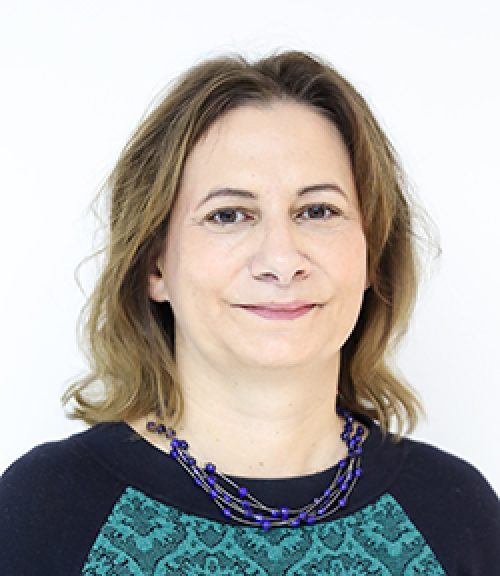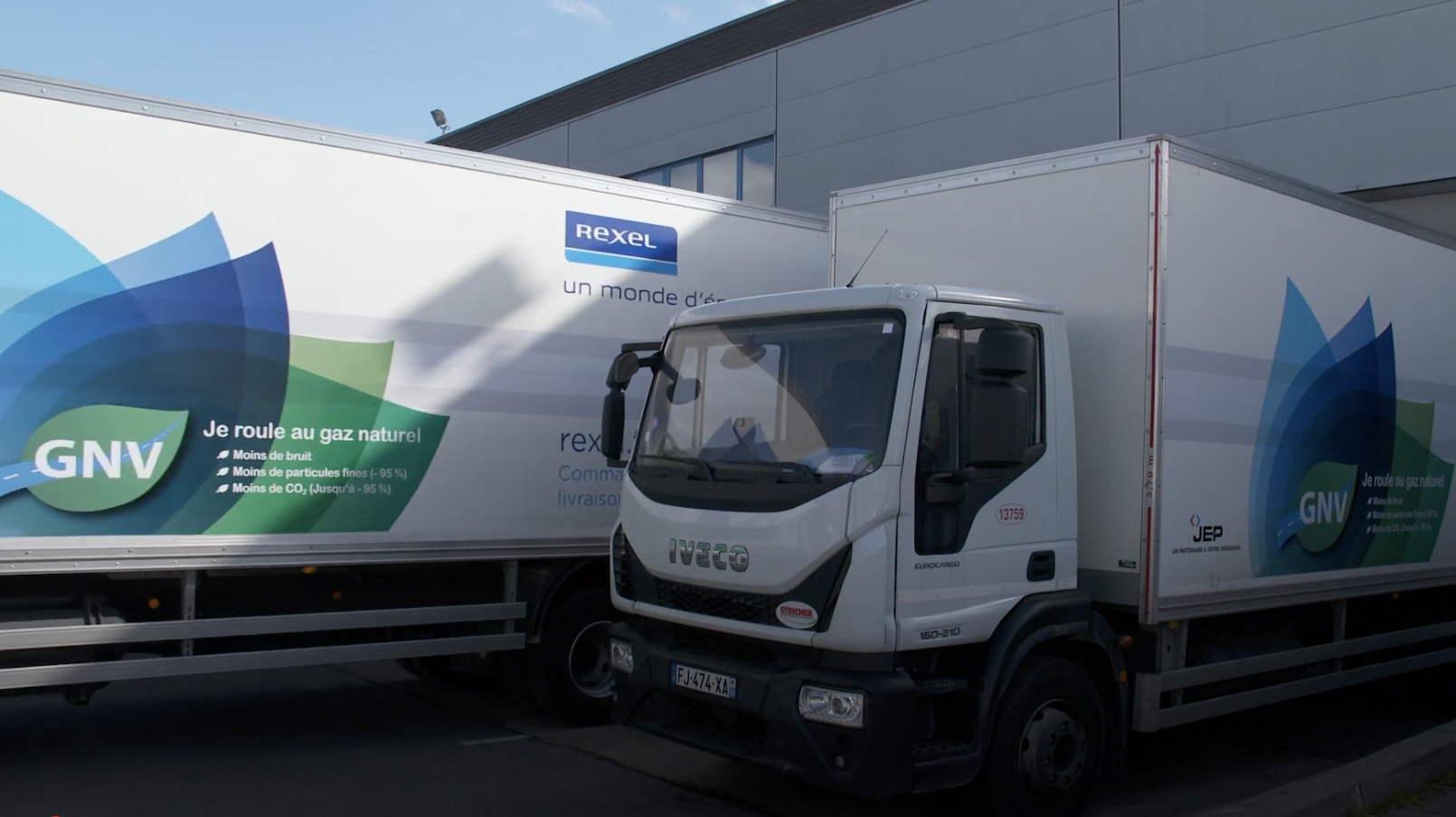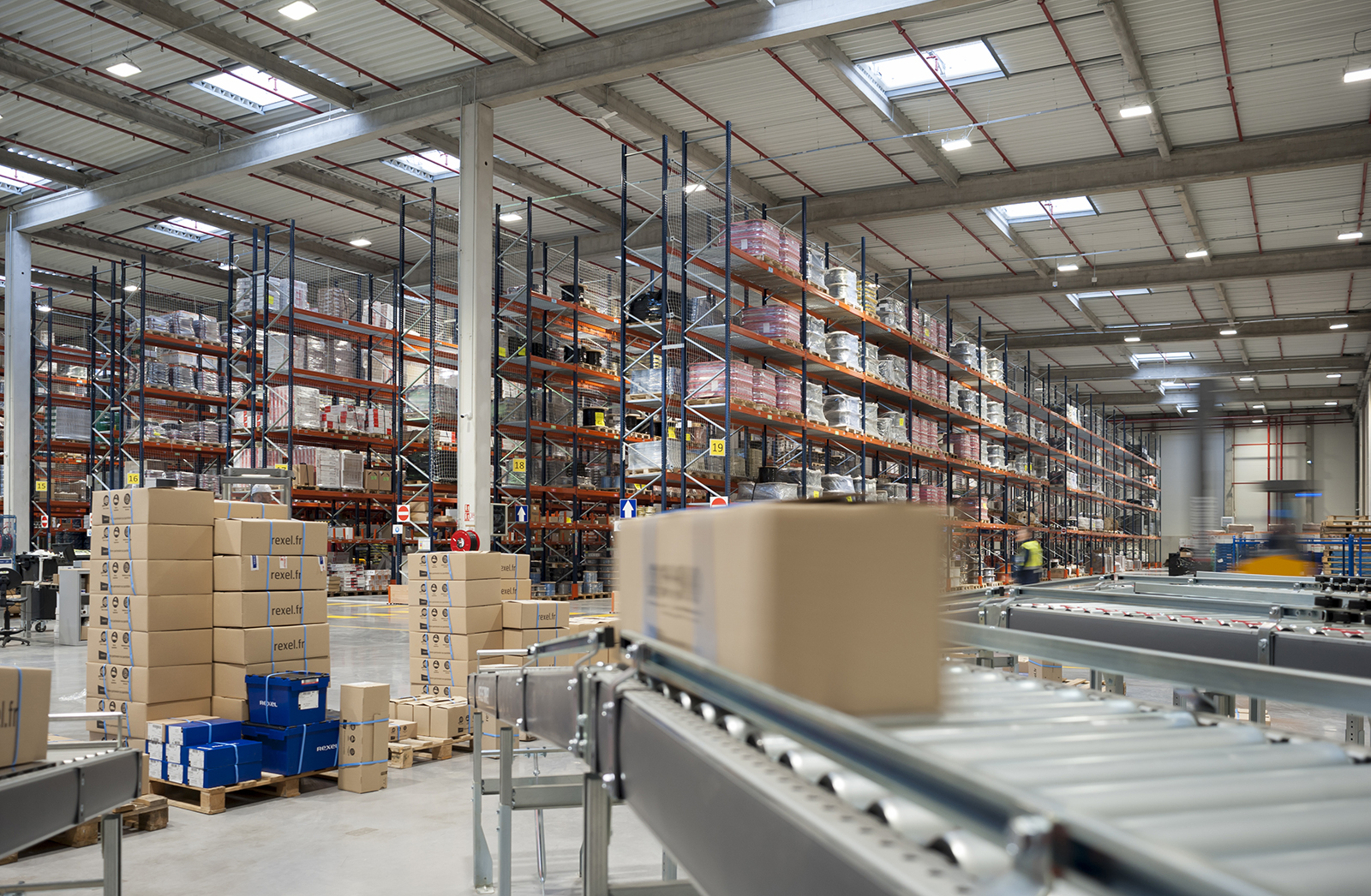In 2017, Rexel began a thorough transformation aiming to enable the evolution of its business model from pure logistician to data-driven services company. This change is in tune with the new demands of the market, competitors, and the economy.
03. A DIGITIZED LOGISTICS MODEL
-
€300 millionhave been invested by the Group in IT systems and digitization since 2018.
-
Digitization and data-driven management
The Group has heavily invested in this transformation so as to optimize the productivity of its operations, increase the added value of its existing services, and offer new ones. Today, Rexel is a major digital player at the forefront of its industry.
Digitization represents a paradigm shift affecting the organization at every level, including all of its work methods and its general mindset. Data and digital tools are becoming the company’s main assets — a key advantage in distinguishing itself from the competition, creating value for its customers, and adopting a momentum of sustainable growth.

-
Up to 80%of new accounts are created via webshops in Europe.
-
Data richness
615,000 active customers, 500,000 online orders per day, 50,000 customer visits to the webshops per week, 15,000 cost estimates per hour: analyses of the data to which the Group has access represent a source of information that its subsidiaries can adapt to suit the local context. The collection and organization of these data form the basis of a relevant and objective analysis of purchasing behavior, especially sensitivity to products, channels, price, promotions, and preferences in terms of modes of interaction.
“For the most part, the digital solutions developed by Rexel rely on increasingly specific customer segmentation taken from these data, completed by external data, and supported by verification algorithms,” explains Constance Grisoni, Data Solutions Manager. “The aim of this approach is to ensure the objective nature of the segmentation.” These past few years, the central functions have helped Rexel’s various countries in improving the collection and quality of data, harmonizing SKUs, and sharing best practices.
3 questions for Jean-Michel Ochs, Group Digital Applications Director
How was the Supplier Portal born?
How have you worked with the Digital and Data Factory to build this innovative portal?
Will this solution be extended to other countries?
-
E-mail to EDIAn automatic email-based order processing solution, E-mail to EDI simultaneously improves service quality and productivity. At the end of 2020, it was operational in eight countries: France, Germany, Belgium, the United Kingdom, the Netherlands, Austria, Italy, and Portugal.165,000orders processed via E-mail to EDI in 2020.
-
Improving the customer experience
“With a platform of 20 webshops and steadily increasing digital penetration rates, the major improvements in our websites today revolve around creating a better customer experience,” says Nicolas Baltzer, Group Product & User Experience Director. The first step in this improvement, usability testing has entered an industrialization phase at a pace of three or four per quarter. Presenting prototypes of new features and improvements to customers prior to launching them online ensures that user expectations and habits are properly accounted for, so that the final result is optimal. Launched in 2019, the tests and prototypes focus on customer priorities: Track & Trace, product page layout (France), order returns, mobile payment methods in branches (Sweden), etc.
To simplify and streamline digital uses in terms of customer experience rather than features, the premiumization trend is intensifying. Its central idea is to promote technological choices that allow customers to do things better and faster, based on an observation of their behavior instead of on supposition. This approach is used for priority areas identified in the Rexel Easy plan.
The Design System project aims for both visual consistency between different digital products from the same country and the provision of code components and reusable templates for local teams when they wish to develop their own tools. Launched at the end of 2019, Design System is currently in use for various projects, including the personalized landing page deployed in France and Germany, the Supplier Portal, and mobile payment in branches (Sweden and the Netherlands). Among its advantages are productivity gains in addition to improved overall visual consistency.

3 questions for Anne-Brisce Grasset,
Digital & Data Factory Director
How was the Data Factory created?
Concretely, how do the Digital and Data Factory teams work?
What were the key solutions developed in 2020 and what are the next steps?
AI boosts sales
“Over the course of the past two years, we have designed several artificial intelligence solutions to accelerate the Group’s digital transformation,” says Constance Grisoni, Data Solutions Manager. “These predictive models, based on algorithms fed by high-quality data, aim to optimize sales. And they succeed.”
To reduce the customer attrition rate, or “churn,” an alert system identifies at-risk customers so that salespeople can react. This solution, which is operational in several European countries including France, is still being deployed. Other tools created during the pandemic have become permanent, such as rebound alerts that enable the identification of customers whose activity is recovering faster than average for their sector or those who, on the contrary, are under-performing.
“These alerts, which were deployed in several European countries and Canada at the height of the pandemic, have been made permanent in order to give salespeople an advance estimate of changes in the life cycle of their customers,” says Laurent Nizard, Data Science Manager.
At the branches, the product mix optimization model aims to provide the right products at the right time both in terms of range width and depth. The Branch Range solution was developed in a multidisciplinary way between the sales, procurement, marketing, and purchasing teams, with substantial training efforts among branch supply managers.

Supporting AI research
On September 15, 2020, Rexel and four other major French companies announced the launch of Hi! Paris, an interdisciplinary research center specializing in artificial intelligence and data analysis. The center is the result of a close partnership between the academic world and innovative companies involved in the digital revolution. In doing so, Rexel, alongside Total, L’Oréal, Capgemini, and Kering intends to maintain its technological advance and be recognized as a world leader in the use of AI in the energy industry.
Led by two prestigious grandes écoles, Institut Polytechnique de Paris and HEC Paris, Hi! Paris aims to become a French and European champion of science, technology, and business, able to rival the world’s finest institutions. Its research on cutting-edge projects will signify heightened competitiveness for the companies that know how to implement them.
Last March, Hi! Paris organized the first-ever AI and data science challenge, Hickathon, on the theme of “AI and energy efficiency.” For 48 hours, 187 students from HEC Paris and the five schools of Institut Polytechnique de Paris divided into 35 multidisciplinary teams accepted the challenge and had to find and present to the judges “the solution that best optimizes energy consumption while lowering carbon emissions and costs.”
With more than 21% of its sales made online, the Group is extremely vigilant in terms of cyber security and has adopted a program that aims to protect user identity, data, and Rexel’s services. This program has three facets: awareness raising and training of employees, risk assessment and management procedures in each country, and the implementation of tools that can detect and correct cyber attacks. “Rolled out almost entirely in all of Rexel’s operating countries, it gives Rexel the tools it needs to continue to fight against the significant increase in cyber attacks that has been observed around the world,” underscores Éric Laterrade, Group CIO. A permanent team is tasked with leading the security manager network in the Group’s various countries.
At the same time, an Information Security Management plan, which falls within ISO 27001 certification, is in place, including raising awareness among all of the Group’s security managers and entities.
A robust supply chain
Rexel’s activity was never interrupted, even if it did suffer from a large volume decrease at the height of the pandemic. This continuity was indispensable in allowing essential services and buildings such as hospitals, certain public buildings, vital industries, and retail outlets covering basic needs to continue to function.
“The maturity of the omnichannel model, combined with the adaptation of the work organization at every level of the company, allowed Rexel to continue to serve all of its customers,” says Xavier Derycke, Supply Chain Transformation Director Europe. Throughout the countries in which the Group operates, only a handful of branches were forced to close temporarily. In this unusual environment, many customers opened an online account for the first time to make orders.
Another of Rexel’s major advantages, says Xavier Derycke: “The supply chain continued to function, thanks in particular to the internalization of logistics centers whose operations we control entirely.” Over the course of the past few years, the supply chain was reorganized in order to constantly better serve our customers. Furthermore, our close ties with local transporters made it possible to swiftly adapt transportation plans and control costs without harming service quality.

-
Life cycleThe life cycle of a product signifies all the phases that a product experiences, from its creation to its removal from the market: prototype, launch, growth, maturity, decline. Depending on the life cycle of its products, the company directs its strategic approach and its marketing mix, and manages its product portfolio.
-
Striving for logistics excellence
Rexel has an internal supply chain that enables it to control service quality and adhere as closely as possible to customers’ needs and expectations. Beyond the constant evolution of IT systems, as well as automation, Rexel has several levers to permanently improve the performance of its supply chain. The management of product life cycles consists in maintaining a satisfactory balance even as manufacturers expand and renew their product ranges more and more swiftly. Thus, the supply chain no longer works in a silo but rather in interaction with marketing, purchasing, IT, HR, sales, etc.
The acceleration of the deployment of the Lean process expresses the Group’s desire to be part of a continuous improvement process. Well established in France, this approach has progressively been implemented throughout all of Rexel’s European countries.
Finally, the reorganization of the network of warehouses and branches in the various countries makes it possible to improve proximity to customers, their projects and their work sites, and to thereby increase the service level while remaining as close as possible to customer needs.
Optimizing merchandise flows and inventory: the example of Cestas 2
The new regional logistics center in Gironde (France), Cestas 2 was created in 2018 to improve the Group’s service efficiency and offering, as well as the environmental performance of its logistics operations.
Beyond the optimization of merchandise flows and inventory across 20,000 m2, the RLC represents 25,000 SKUs available on a next-day basis and a strong commercial potential in the region of Nouvelle Aquitaine, which is, with its 55 branches and 22,000 customers, a strategic region for Rexel.
Cestas provides an extended range, as well as increased product diversity and availability.
The construction of the building met the challenge of strict environmental requirements to reach very low energy consumption, particularly thanks to the installation of 729 solar panels enabling a 20% reduction of the energy bill. Certified BREEAM (Building Research Establishment Environmental Assessment Method), Cestas 2 also meets ICPE regulations (Installation Classée pour la Protection de l’Environnement – Classified Installation for the Protection of the Environment).

